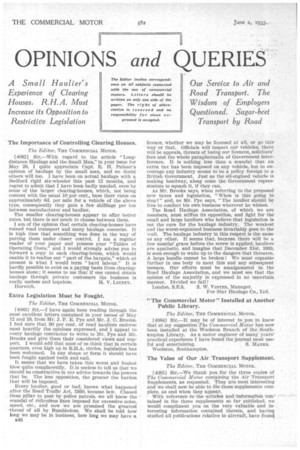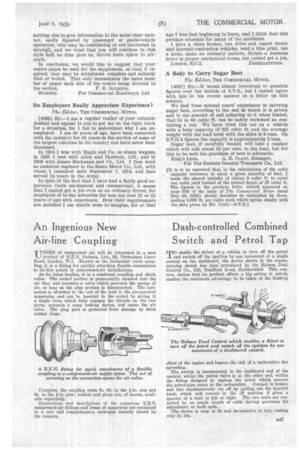OPINIONS and QUERIES
Page 64

Page 65

If you've noticed an error in this article please click here to report it so we can fix it.
A Small Haulier's Experience of Clearing Houses. R.H. A. Must Increase its Opposition to Restrictiue Legislation Our Service to Air and Road Transport. The Wisdom of Employers Questioned. Sugar-beet Transport by Road
The Importance of Controlling Clearing Houses. The Editor, THE COMMERCIAL MOTOR.
[4082] Sir,—With regard to the article "Longdistance Haulage and the Small Man," in your issue for May 2G, I quite appreciate Capt. E. H. PaImer's opinion of haulage by the small man, and no doubt others will too. I have been on actual haulage with a Bedford rigid six-wheeler this past 12 months, and regret to admit that I have been badly mauled, even by some of the larger clearing-houses, which, not being content with the usual 10 per cent., base their rates on approximately Gd. per mile for a vehicle of the above type, consequently they gain a few shillings per ton between manufacturer and haulier.
The smaller clearing-houses appear to offer • better rates, but, there is not much to choose between them.
I am. of the opinion that certain clearing-houses have ruined road transport and many haulage concerns. It is high time that something was done in the way of putting them under closer control. I am a regular reader of your paper and possess your "Tables of Operating Costs," and I would strongly advise you to forward a copy to each clearing-house, which would enable it to realize our "part of the bargain," which at present is what I would term "hard labour." It is hardly possible to exist on a paying basis from clearinghouses alone ; it ,seems to me that if one cannot obtain haulage through private customers the business is
really useless and hopeless. II. V. LINNEY. Horwich.
Extra Legislation Must be Fought.
The Editor, THE COMMERCIAL MOTOR.
140831 Sir,—I have again been reading through the most excellent letters contained in your issues of May 12 and 19, from Mr. J. P. E. Pye and Mr. J. C. Brooks. I feel sure that 90 per cent. of road hauliers endorse most heartily the opinions expressed, and I appeal to every haulage contractor to write to Mr. Pye and Mr. Brooks and give them their considered views and support. I would add that most of us think that in certain quarters, even high up in R.H.A. circles, legislation has been welcomed. In any shape or form it should have been fought against tooth and nail.
It seems that we have taken this worst and foulest blow quite complacently. It is useless to tell us that we should be constructive in our advice towards the powers that be. The less opposition, the greater the burden that will be imposed.
Every haulier, good or bad, knows what happened after the Road Traffic Act, 1930, became law. Chased from pillar to post by.police patrols, we all know the scandal of ridicultrus fines imposed for excessive noise, speed, etc., and now we are promised the greatest
• threat of all by Burnbledom. We shall be told how long we may be in business, how long we may have a u46
licence, whether we may be licensed at all, or go this' way or that. Officials will inspect our vehicles, there will be appeals, threats of losing our licences, solicitors' fees and the whole paraphernalia of Government interference. It is nothing less than a scandal that an extra tax has been imposed on any vehicle, but to encourage any industry seems to be a policy foreign to a British Government. Just as the oil-engined vehicle is making headway, along come the Government repressionists to squash it, if they can.
As Mr. Brooks says, when referring to the proposed new taxes and legislation, "When is this going to stop?" and, as Mr. rye says, " The hardier should be free to conduct his own business wherever he wishes. '
The Road Haulage Association, of which we are members, must stiffen its opposition, and fight for the small and large hauliers who believe that legislation is not the cure for the haulage industry. The weakest and the worst-organized business invariably goes to the wall. The haulage industry in this respect is the same as any other. It seems that, because there will be a few months' grace before the screw is applied, hauliers are apathetic, and imagine that December 31st, 1933, is soon enough to wake up to the dangers that threaten. A large bundle cannot be broken! We must organize further in one body to meet this and any subsequent menace. Our efforts must be amalgamated in the Road Haulage Association, and we must see that the opinion of the majority is expressed in no uncertain manner. Divided we fall !
London, S.E.8. S. W. VINTER, Manager, For Star Haulage Co., Ltd.
"The Commercial Motor" Installed at Another Public Library.
The Editor, THE COMMERCIAL MOTOR.
[4084] Sir,—It may be of interest to you to know that at my suggestion The Commercial Motor has now been installed at the Woolston Branch of the Southampton Library. As a motor engineer of many years' practical experience I have found the journal most use
ful and entertaining. S. MARKS. Woolston, Southampton.
The Value of Our Air Transport Supplement.
The Editor, THE COMMERCIAL MOTOR.
[4085] Sir,—We thank you for the three copies of The Commercial Motor containing the Air Transport Supplements, as requested. They are most interesting and we shall now be able to file these supplements complete, as and when they appear,
With reference to the .artieleS and 'informarien 'con-` tamed in the three supplements so far published, we would compliment you on the very valuable and interesting information contained therein, and having studied all publications relative to aircraft, have found nothing else to give information in the same clear mariner, easily digested by passenger or goods-vehicle operators, who may be considering or are interested in aircraft, and we trust that you will continue in this style and, as time goes on, devote more space to aircraft.
In conclusion, we would like to suggest that your centre pages be used for the supplement, so that, if required, they may be withdrawn complete and suitably filed or bound. This only necessitates the same number of pages each side of the centre being devoted to the section. F. E. GOLDING, Bromley. For Commercial Roadways, Ltd
Do Employers Really Appreciate Experience?
The Editor, THE COMMERCIAL MOTOR.
[4086] Sir,--I am a regular reader of your valuable Journal and appeal to you to put me on the right track for a situation, for I fail to understand why I am unemployed. I am 48 years of age, have been connected with the industry for 28 years in the service of some of the largest concerns in the country and have never been dismissed.
In 1904 I was with Maple and Co. on steam wagons, in 1906 I was with Allen and Hanbury, Ltd., and in 1909 with James Buchanan and Co,, Ltd. I then went as assistant engineer to the Essex Motor Co., Ltd., with whom I remained until September 7, 1914, and then served 5f years in the Army.
In spite of the fact that I have had a fairly good experience (both mechanical and commercial), it seems that I cannot get a job even as an ordinary driver, for employers of to-day advertise for men not over 21 or 22 years of age with experience. How their requirements are satisfied I am unable even to imagine, for at that age I was just beginning to learn, and I think that this perhaps accounts for many of the accidents. I have a clean licence, cart drive and repair steam and internal-combustion vehicles, read a blue print, use a lathe, make an ordinary pattern, dictate a business letter in proper mechanical terms, but cannot get a job.
London, EC.2. DisBEARTENED.
A Body to Carry Sugar Beet The Editor, THE COMMERCIAL MOTOR.
[4087] Sir,—It seems almost irreverent to question figures over the initials of S.T.R., but I cannot agree with him in his recent answer to a letter on this subject.
We find from several years experience in carrying sugar beet, according to the soil in wiiich it is grown and to the amount of soil adhering to it when loaded, that 54 to 60 cubic ft. can be safely reckoned as containing a ton. We have tried this out on a vehicle with a body capacity of 325 cubic ft. and the average weight with the load level with the sides is 6 tons. On S.T.R.'s figures the capacity is approximately 2 tons.
Sugar beet, if carefully loaded, will take a camber which will add about 20 per cent. to the load, but for this to be safe the provision of nets is advisable.
King's Lynn. A. E. IVATT, Manager, For The Eastern General Transport Co., Ltd.
It is to be regretted that, in the calculations of the cubic capacity necessary to carry a given quantity of beet, ' 'made the absurd mistake of taking 9 cubic ft. to equal one cubic yard instead of the correct figure of 27 cubic ft. The figures in the previous letter (which appeared an page 534 of the issue of The Commercial Motor dated May 26, 1933) should therefore be multiplied by three, making 1,080 lb. per cubic yard, which agrees closely with the data given by Mr. Ivatt.—S.T.R.]




































































































